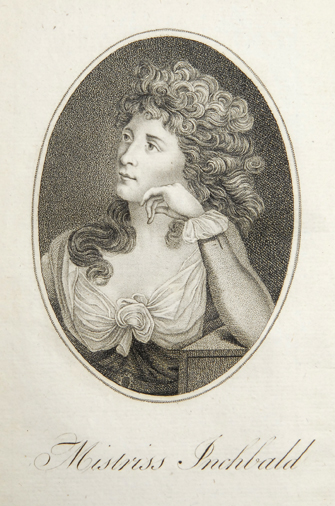Here is an amazing story I rustled up from this book:
Have you ever heard of Elizabeth Inchbald (1753-1821)? She is a woman with an incredibly independent spirit for her age (well, for any age!) who was a novelist, playwright, and actress.
Elizabeth was a farmer's daughter who was never formally educated but read a lot. Her passion was the theater, and she ran away at 17 to London to become an actress, leaving a note of apology for her mother. A few days later, she sought refuge with her married sisters, and her mother forgave her for fleeing. An actor, Joseph Inchbald, who had two illegitimate daughters, pursued her and offered marriage. They were in an acting company together, and performed Shakespeare as well as plays by popular playwrights.
Her marriage was not perfect. In her diaries she recorded that her husband was often jealous and made scenes after his drinking. In her travels, she met the actor and stage manager John Phillip Kemble, worked in one of his plays, and clearly made her husband jealous by her friendship with him. He was her lifelong friend and also apparently her unrequited love, but she denied that they were ever lovers.
Here are some images of Elizabeth, before I continue on with her story:

Suddenly widowed in 1779, Elizabeth decided to continue to act while she pursued writing. She used her stage salary as security. Although she had multiple offers of marriage, she refused them all, preferring her independence. A novel she wrote was rejected, as were several plays, but she had great success at last with the play A Mogul's Tale in 1784. "There is no woman I more truly admire, nor any man whose abilities I more highly esteem," wrote John Kemble, who did not offer marraige as Elizabeth must have hoped. The author William Godwin, husband of Mary Wollstonecraft, was, however, one of the men who did propose marriage, but she declined.
In all, Elizabeth wrote over 20 plays. The work she is most well known for is a novel called A Simple Life. Reportedly, she patterned the hero after Kemble. He is handsome, romantic, but unheroic--it is not a flattering portrait.
The theme of A Simple Life is that a proper education is essential for women to make the right choices in life.
Elizabeth continued to live independently on her earnings until her death.
Spunky, intelligent, and independent...now that's a real-life Regency heroine for you!
Sources:
Passion and Principle: the Loves and Lives of Regency Women by Jane Aiken Hodge. John Murray Publishers, London, 1996.
Elizabeth Inchbald, article by Elma Scott, Chawton House Library, viewed at: http://www.chawton.org/library/biographies/inchbald.html



No comments:
Post a Comment